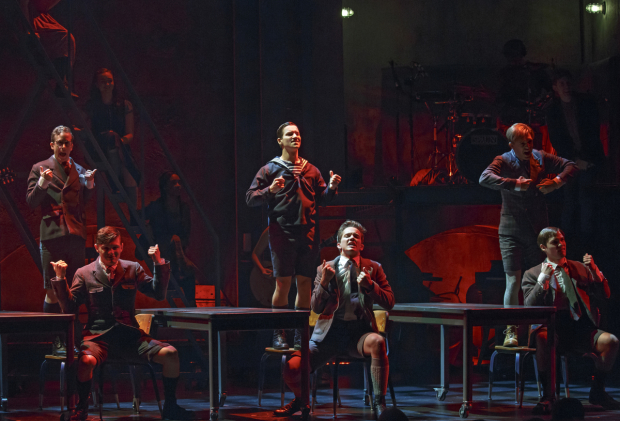Spring Awakening

(© Joan Marcus)
Some musicals are inextricably tied to the moment of their debut, while others only seem to grow richer with each subsequent production. The latter is the case for Steven Sater and Duncan Sheik's Spring Awakening, at least in its current iteration at the Brooks Atkinson Theatre. It comes to Broadway via Los Angeles' Deaf West Theatre and features a mixed cast of deaf and hearing actors, with each line simultaneously spoken and presented in American Sign Language. The result is a thrilling new look at a musical that still bears hidden treasures nine years after its initial Broadway debut.
Back then critics remarked about the unlikely congruity of rock music and middle-class teenagers living in fin-de-siècle Germany. The show is based on Frank Wedekind's controversial 1891 play about the alienation of young adulthood, a subject well-covered in the realm of emo rock. Deafness offers a similarly fruitful context for this tale of teen angst. Certainly, feelings of loneliness and frustration are exacerbated when most of society would rather ignore you than take the time to learn your language.
Hearing or deaf, all of the school-age characters face obstacles in their quest to forge some sort of human connection. Star student Melchior (the dreamy Austin P. McKenzie) questions the bourgeois adult society he's hurtling toward. His best friend Moritz (the funny and relatable Daniel N. Durant) struggles with academic pressure and worries he won't even be allowed into that society. Wendla (a vulnerable Sandra Mae Frank) can't seem to get a straight answer about how babies are made. Meanwhile, Ilse (Krysta Rodriguez, simultaneously tough and at-risk) gives up on "polite society" and moves in with a colony of lecherous artists.
Artificial barriers separate the characters in the script, but this reimagining allows for new relationships to blossom: The deaf actors are shadowed by hearing ones who voice their lines and serve as alter egos. The brooding and soulful Alex Boniello is the wild rock star itching to break free from Moritz's too-tight suit. We are devastated when Wendla is pulled away from her voice (the sweet and melodious Katie Boeck). These visible relationships hugely illuminate the internal lives of the teens.
Everything benefits from director Michael Arden's muscular approach (this is his first time helming a Broadway show). Arden, who first appeared on Broadway as Tom Sawyer in the 2003 Deaf West transfer of Big River, expands on the innovations of that groundbreaking revival. He brings instruments into the mise-en-scène in a manner reminiscent of the work of John Doyle, incorporating the musicians into the stage action (the band really rocks out to Sheik's infectious score). Arden overlaps an intimate moment between Wendla and Melchior with a religious ritual. The ensemble takes communion as censers swing down the aisles emitting an autumnal scent that will smell like church to some, a first roll in the hay to others. Either way, it's a brilliant use of olfactory design (smell being the sense most closely tied to memory). Arden's Brechtian embrace of theatricality proves to be vital to the epic theater of adolescence.
Spencer Liff's inventive choreography similarly deepens our understanding of the story. As Melchior delivers a speech on the parents and teachers that "view us as merely so much raw material for an obedient and productive society," the ensemble marches in military formation, reminding us that this is the generation who will sire the Nazis and that their sexual and intellectual repression is really just the thin edge of the fascist wedge.
No one foreshadows that more than Patrick Page, who serves as one of four actors playing all the adults (the other three are the kindly Marlee Matlin, the terrifying Russell Harvard, and the hilarious Camryn Manheim). Page embodies the cruelty of the hearing world, regularly shouting at the deaf characters as if that will make them hear him. When he forces Moritz to recite Latin using his voice we are reminded of the ugly legacy of oralism (a form of deaf education that eschewed ASL in favor of speech and lip-reading). As if there were any doubt, this performance solidifies Page's reputation as Broadway's foremost portrayer of villains.
Andy Mientus (who is engaged to Arden) gives a positively haughty performance as Hanschen, the maddeningly self-confident teenage homosexual happy to "skim off the cream" of a corrupt status quo. It's a role that comes across much truer to Wedekind's original intent than it did in 2006, when audiences were still shell-shocked by a wave of anti-gay referenda and any depiction of gay teens was seen as a tiny victory. Here we can more freely admit the truth: Hanschen is a jerk. Since his big scene doesn't come until late in the second act, costume designer Dane Laffrey cleverly gives us a sense of the character from the beginning by outfitting him in a perfectly tailored brown plaid suit, complete with a preppy tie and brooch. He looks like the lost gay Heather.
Laffrey (who also designed the set) has turned the stage into a cold and dank institution, as versatile as it is evocative. Ben Stanton's lighting design straddles the line between Brecht and a rock concert, helping us to regularly escape from the set's oppressive confines. Every design choice in Spring Awakening feels thoroughly considered. All the while, Arden maintains an air of spontaneity, as if the story were just materializing before us. That's real craft at work.
This revival of Spring Awakening is that rare reimagining that furthers the themes of the original work, rather than plastering over them with an auteur's vision. It's hard to envision it being staged any other way in the future. Then again, "otherness" is not a feeling unique to deaf people. In that respect, Spring Awakening is a universal tale, begging to be reinvented again and again.










